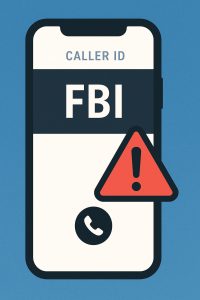You’ve probably heard the term “phishing” before. Some people spell it like “fishing” — and that’s actually a good way to think about it. Just like a fisherman throws out bait to catch a fish, scammers throw out fake calls, emails, and messages to “catch” you. Their goal is to trick you into giving away private information like passwords, bank account numbers, or Social Security details.
Phishing is a type of scam where criminals pretend to be someone you trust — a bank, the government, or even a company you do business with.
They use:
Emails that look official
Texts (SMS) with fake links
Phone calls (vishing) that sound urgent
All of it is designed to steal your personal or financial details.
I recently received a voicemail. Caller ID said it was from the FBI’s New York field office (212-384-1000) — which made it look official. But the message claimed to be from Coinbase:
“If this login attempt was not authorized by you, please press one to speak to a representative. Otherwise, you may disregard this phone call. Thank you for your response. A Coinbase representative will contact you shortly regarding this case. Please do not share any personal information like passwords or case ID numbers. We will never request any information over the phone. In the case anyone claiming to be from Coinbase request such information, feel free to report this to the Better Business Bureau or through our official Coinbase domain or the one time secure access portal…”
At first glance, it feels professional. They even say not to share your information — which is a clever trick to sound more trustworthy. But it’s a scam.

Here’s what made this voicemail suspicious:
Caller ID spoofing. The number showed up as the FBI, not Coinbase.
Unsolicited alert. I never logged into Coinbase, so how would they know?
Scare tactics + reassurance. First they say “unauthorized login,” then they calm you by saying “don’t share info.”
Vague instructions. They mention a “secure access portal” but give no real link.
Don’t press numbers or call back. That’s how they connect you to a scammer.
Go direct. If it’s Coinbase, open the app or website yourself — never trust numbers or links from a message.
Don’t trust caller ID. Numbers can be faked.
Report it. File phishing attempts at reportfraud.ftc.gov or with the company being impersonated.

Scammers are getting sneaky, but you can still outsmart them. This voicemail sounded polished, but it was just another lure on the line.
Remember: Pause, think, verify. That quick check can save you from giving a scammer exactly what they want.
At Paragon Web, we believe education is your first defense online.
👉 Share this article with friends and family so they know how to spot phishing scams.
👉 Stay tuned for more plain-English guides to keeping yourself safe online
Infrastructure, security, and performance. Handled at the root level, not with band-aids.
Entire Site and Content Copyright © 2014-2026 - Paragon Web Services - Privacy Policy - Terms of Service